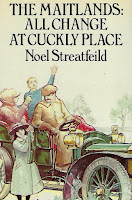Having finally acquired and read Noel Streatfeild’s short novel ‘Meet the Maitlands’ just over four years ago, I looked out for its sequel, ‘The Maitlands: All Change at Cuckly Place’ at second-hand bookshops online. Neither book is in print, despite many of this author’s children’s books having been republished many times.
I finally managed to track down a reasonably priced edition a few months ago. To my surprise, like the first book, it’s a hardback with a dust cover in almost perfect condition. When I realised I had almost entirely forgotten the characters and plot of ‘Meet the Maitlands’, I re-read it yesterday, then finally picked up ‘All Change at Cuckly Place’ last night. It’s not a long read, and I finished it today.
This is the last book Streatfeild published; she was 84 at the time of writing, and was evidently attempting something a little different with this pair of books. They’re set at the turn of the 20th century; this one starts about five years after the first book ends. The twins Selina and John are sixteen. John is reasonably happy at his boarding school, and Selina has been educated at home, with her siblings, by their governess Laura Dinage.
The first major event in the book is that their rather shadowy grandfather, The Squire, dies. His house, known as The Place, is inherited by his oldest son Tom, who comes to live there with his family. His next brother, Timothy, also returns to the UK with his wife and three young daughters and they also come to live at The Place. Miss Dinage is hoping to leave to get married to a local farmer. But there are now nine Maitland children to be taught at home, so she’s persuaded to keep teaching them after getting married.
There are too many characters in this book for any of them to stand out; John is still sensitive, but is mostly away at school. Selina is almost grown up, and her younger brothers play very little part. Chloe, Selina’s sister (who is about thirteen) is keen on dancing; this is typical for a Noel Streatfeild book, but as her father is a rector, any dancing other than social ballroom dancing is rather frowned upon. There are some quite dramatic scenes related to this, although no real resolution.
Running alongside the Maitlands’ day-to-day lives as they settle in together is the story of Violet, the bright girl from a working-class background who went on to grammar school. She’s now an adult and involved in the Suffragette movement in London. The attitudes of the era are shown in various ways, with several of the women being quite keen for women to get the vote, and more of a place in society. It’s a book for older children so while violence and imprisonment are mentioned, there are no details.
Streatfeild’s books often end somewhat abruptly, with a sudden resolution and brief ending tying things up in the last chapter. This book ends during a family holiday in July 1914…. I’m not good with dates, but even I was aware that this is the month when World War I was declared. And then after a final comment implying great stress and pain for John and Selina, the book ends.
I assume the author was intending to write a further book about the Maitlands, but never managed it; she died a few years later after suffering from a series of strokes. So the fate of the Maitlands is left open.
Overall, I found it disappointing. All the characters, other than Laura Dinage, seem rather flat, and there’s no real storyline at all. However it's a quick read. As a piece of social history, I think it’s worth reading by anyone (child or adult) interested in life in the UK in the early 1900s. However I can no longer find it online anywhere.
Review copyright 2018 Sue's Book Reviews

No comments:
Post a Comment